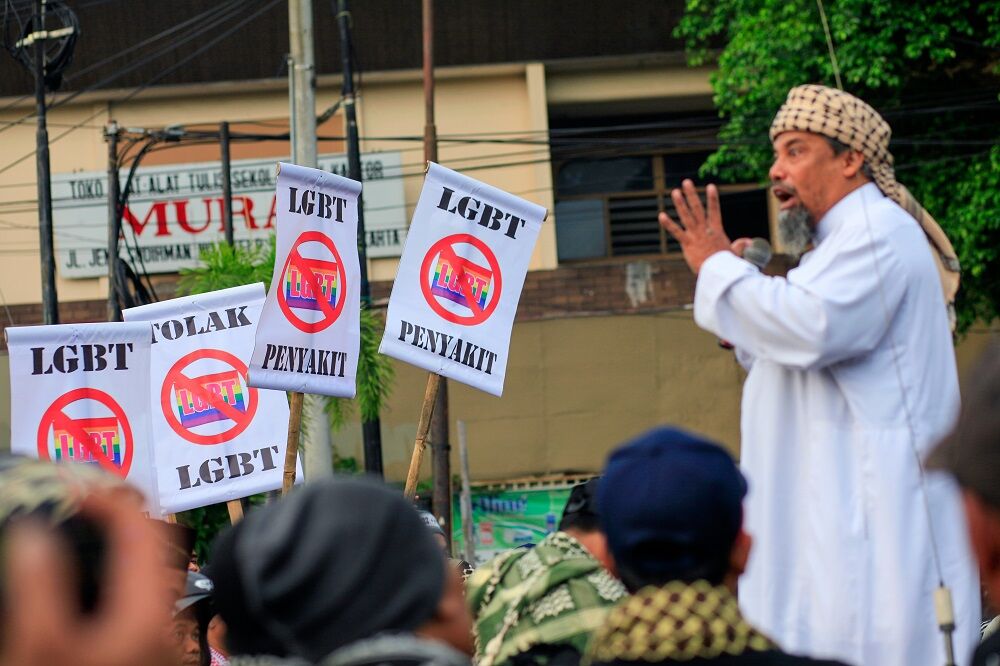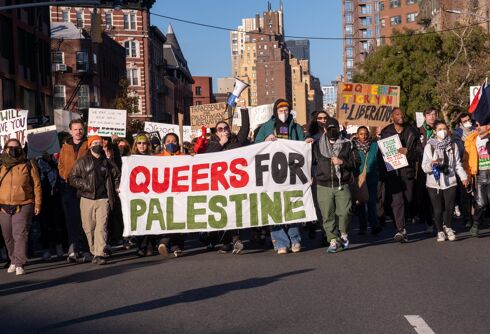In Indonesia, a new proposal in Parliament would ban LGBTQ+ content from broadcast in Indonesia, including online streaming platforms.
The far-reaching legislation includes a prohibition on investigative journalism and a ban on content displaying violence, mysticism, and “negative behavior or lifestyles that potentially harm the public.”
Related:
Coldplay concert in Indonesia protested by hundreds of anti-LGBTQ+ Muslims
Protesters clashed with police and accused the band of being “LGBT propagandists.”
Homosexuality is already a taboo subject in Indonesia, a Muslim-majority country and the world’s third-largest democracy. While homosexuality isn’t technically illegal in the country, conservative authorities have cracked down on LGBTQ+ venues, and same-sex relations are illegal in the Sharia-ruled Aceh province.
Global perspectives delivered right to your inbox
Our newsletter bridges borders to bring you LGBTQ+ news from around the world.
“We don’t want to give the impression that we are homophobic, and monitor excessively,” Nico Siahaan, a legislator and a member of the commission overseeing the bill told Reuters.
Siahaan stressed the proposed changes to the country’s 2002 broadcast law are in the initial phases and subject to change, and predicted the new law’s provisions would be strongly debated.
“The impact on press freedom is very serious,” said Arif Zulkifli, head of Indonesia’s Press Council law and legislation division. The changes would undermine media independence, he added.
“Indonesia’s press law says there must not be any censorship or banning of journalism. So this is contradictory,” he added.
Indonesia emerged from decades of authoritarian rule in 1998. The 2002 broadcast law was written in response to the military dictatorship’s suppression of press freedoms and communication.
Details in the bill were scant about how the new prohibitions would be enforced, but journalist groups expressed concern about a return to censorship.
“It will mean that we as journalists will no longer be able to reveal important stories, such as on corruption, nepotism, and environmental crimes,” said Bayu Wardhana, head of the Association of Independent Journalists.
Filmmaker and former reporter Joko Anwar called the proposal “dangerous” and “impossible” to implement.
“The ban on such content not only impedes the creativity of the creative industry, and freedom of the press, but also undermines people’s capacity to filter what they watch,” he said.
Press Council Chair Ninik Rahayu said his group had not been consulted during the bill’s drafting process.
“If the bill is implemented, there will be no press independence,” Rahayu said.
Despite being considered relatively moderate for a Muslim nation when it comes to LGBTQ+ rights, gay people have come under fire from intolerant segments of the public and hardline Muslim lawmakers.
Last fall, a Coldplay concert in Indonesia was protested by hundreds of anti-LGBTQ+ Muslims who clashed with police and accused the band of being “LGBT propagandists.”
In 2022, Indonesian soldiers were jailed for having gay sex after a ruling that said that it was inappropriate for soldiers to be gay because they “should be an example for the people.”
A law passed the same year banned sex outside of marriage, with violators — including tourists to Bali and other popular gay and straight destinations — facing up to a year in prison.
Don't forget to share:














